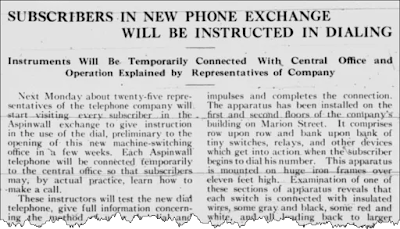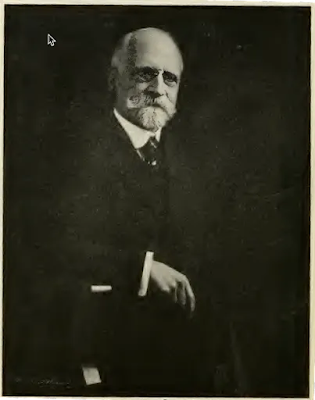 |
| July 14, 1923 |
July 9, 1897 - Disappearance of Grace Stevenson
July 13, 1900 - Samuel Dutton leaves as school superintendent
July 12, 1921 - "Fire Queen" taken into custody
July 14, 1923 - First self-dialed phones in New England
July 9, 1897
Disappearance of Grace Stevenson
The disappearance of 25-year old Grace Stevenson, last seen leaving her house and boarding a Boston-bound streetcar, garnered national headlines after her family went public with their search two months after she vanished.
Stevenson, the daughter of a wealthy Brookline real estate developer, had left her Beacon Street home, near the intersection with Short Street, in April, seemingly on her way to a brief errand. Her mother, after searching privately and ruling out suicide or elopement, went public with the search.
Sightings were reported for more a decade after she disappeared. In 1911, fourteen years after she was last seen, her mother met backstage at the Tremont Theater in Boston with the actor Margaret Anglin, who had to convince the distraught woman that she was not her daughter.
July 13, 1900
Samuel Dutton leaves as school superintendent
Samuel Train Dutton, who made major changes in 10 years as Brookline's Superintendent of Schools, left to become a professor of school administration at Teachers College, Columbia University.
Samuel Dutton leaves as school superintendent
Samuel Train Dutton, who made major changes in 10 years as Brookline's Superintendent of Schools, left to become a professor of school administration at Teachers College, Columbia University.
 |
| Samuel Train Dutton (1849-1919) |
Among the innovations Dutton brought to Brookline were teacher training and continuing education and hiring of college educated women to teach younger grades. "There was a general impression that college women could not be interested in the idea of teaching in elementary school," according to a biography of Dutton written three years after his death. "Mr. Dutton believed that this conviction was erroneous, and that the error could be demonstrated."
Dutton also oversaw the building of a new, larger high school for the town. replaced a building that, according to his biographer, was "poorly housed in a small building, inadequately equipped and cared for, the Cinderella of the Brookline school system." The new high school opened in 1895 on Greenough Street.
July 12, 1921
"Fire Queen" taken into custody
"Fire Queen" taken into custody
A series of fires deliberately set in Brookline and nearby communities over the course of more than a year came to an end with the arrest of a Roxbury man who soon confessed to the crimes. The mysterious arsonist had dubbed themself as the "Fire Queen" in a letter claiming to have set dozens of blazes to please "the God of fire."
 |
| Boston Globe, July 13, 1921 |
The fires had generally been set at homes when they were unoccupied, often because the owners were away at summer homes at the time. There were some reports that items were stolen from the properties before they were set on fire.
Frederick A. Price was arrested in Brookline but charged in Newton, where a witness was able to identify him as having been at the scene of one of the fires. In his confession, he reportedly said he set the fire because of headaches that "could only be satisfied by watching the flames and firemen and listening to the noise."
NOTE: I could find no record of a conviction or his being sent to prison or a mental institution. In 1940 he was living in the South End of Boston and employed, surprisingly, as a night watchman at a warehouse.
July 14, 1923
First self-dialed phones in New England
The customers had been supplied with new dial telephones. Phone company representatives visited people's homes to show them how to use the new devices, and instructions were distributed in flyers and through the newspapers.
First self-dialed phones in New England
Before smartphones, before cell phones, before keypads and answering machines and area codes, before much of what we think of when we think of telephones today, Brookline played a part in the introduction of a major innovation in telephone technology.
At midnight on the night of July 14, 1923, some 1,800 customers of the Aspinwall exchange office on Marion Street became the first in New England to be able to make calls themselves without having to speak first to an operator.
 |
| When the old Marion Street building of New England Telephone, left, was torn down, the entry to the building was preserved as an arch, right, leading to the new condominium complex on the site. |
The customers had been supplied with new dial telephones. Phone company representatives visited people's homes to show them how to use the new devices, and instructions were distributed in flyers and through the newspapers.

No comments:
Post a Comment